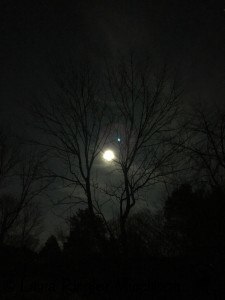Last night was 2016’s Full Wolf Moon. When I posted this pic on Facebook a friend from church was good enough to inquire as to its significance. I thought how lovely it was of her to have taken the time to ask and to want to know. So I decided to publish this for the benefit of anyone who might also be interested. “Full Wolf Moon” is January’s full moon. It got its name by some Native American tribes because at this time of year wolves would often howl in their search for prey which was scarce. Food shortages in winter months meant they had to scavenge wherever they could and travel closer into villages. I have full blood friends in many Indian nations but since I cannot say for sure to which tribe(s) it should be attributed I will only speak to what I know. My paternal grandmother was Choctaw. Each month has a name relating to the seasons and, later, also a Europeanized name since they were “colonized” by the French. Until the early 1800’s, Choctaws used a calendar with the months based upon the phases of the moon. The basic meaning of the word “hashi” (month) can also mean the moon, hashi ninak aya, “sun that travels at night”. The year was divided into two segments: hashtula, winter, and tofa, summer; each having six months. Winter began around September 22, with Chafiskono, the autumnal equinox. Summer began around March 22, with Tek i Hashi, the vernal equinox. Listed below are the modern and older Choctaw names:
Hashtula – Winter:
October: Aktoba (Hochafo iskitini) Little Hunger month
November: Nofimba (Hochafo chito) Big Hunger month
December: Tisimba (Hashi koi chito) Big lion month
January: Chanueli (Hashi koi nakfi sushi) Lions’s little brother month
February: Fibueli (Hashi watonlak) Crane month
March: Macha (Hashi mahli) Wind month
Tofa – Summer:
April: Eplil (Tek i Hashi) Women’s month
May: Me (Hashi Bihi) Mulberry month
June: Chuni (Hashi Bissa) Blackberry month
July: Chuli (Hashi kati) Sassafras month
August: Akas (Hashi Takkon) Peach month
September: Siptimba (Hashi Hoponi) Cooking month
Month names also sometimes vary now according to location: Mississippi (Choctaw homeland), and Oklahoma, now a separate tribal nation. They were the first to be forced to make the Long Walk on the “Trail of Tears” in 1831. Driven out of their ancestral lands, they were marched by militia into what was then Indian territory to make way for white “settlers”. Thousands died along the arduous journey as it was made during winter’s harsh sting.
“My friends, circumstances render it impossible that you can flourish in the midst of a civilized community. You have but one remedy within your reach, and that is to remove to the west. And the sooner you do this, the sooner you will commence your career of improvement and prosperity.” ~ President Andrew Jackson
Wolves, like Native peoples, are STILL treated abysmally all around our world every single day. After centuries of willful, deliberate destruction of both by Europeans, one can only pray it will finally come to an end. Achukma hoke.

